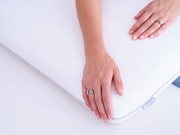The sponge you use to wash your dishes could be hiding something shocking
- Replies 5
For those of us not lucky enough to have a dishwasher, the humble sponge is our go-to for banishing tough grime on our dishes. It makes dishwashing that much easier and it has never failed to deliver. However, it seems that we may need to start looking for other options, as one study found that kitchen sponges are a haven for bacteria.
The study compared bacteria on used sponges and brushes, following up on a lab-based study published the previous year by the same team of researchers. The result? Harmful bacteria survived better in sponges than in brushes.
“Salmonella and other bacteria grow and survive better in sponges than in brushes, the reason is that sponges in daily use never dry up,” explained Trond Møretrø, a research scientist at a Norwegian food research institute.
“A single sponge can harbour a higher number of bacteria than there are people on Earth,”
While several types of bacteria are not harmful, types such as Salmonella can easily spread from sponges to hands, kitchen surfaces, and equipment. This can potentially make people sick.
“The sponge is humid and accumulates food residues which are also food for bacteria, leading to the rapid growth of bacteria.”
Yikes! Image Credit: Self
What shocked the researchers the most about their findings is that even cleaning the sponges regularly and thoroughly doesn’t help as much as you might think.
“The way the consumers used their sponges did not matter much regarding the growth of bacteria. It is very difficult for consumers to avoid bacterial growth in the sponges as long as the sponges are not replaced daily,” Trond said.
The USDA said microwaving or boiling kitchen sponges may reduce “some of the bacterial load”. However, these measures alone were not adequate to ensure your sponge reduced cross-contamination. And so, experts advised that the best option is to simply buy new sponges regularly.
The research was part of a European Union-backed project on food safety.
They studied kitchen sponges from 20 people living in Portugal and 35 brushes and 14 sponges from people residing in Norway.
An earlier survey of 9966 people by the research team discovered that sponges were most commonly used for cleaning kitchens in the majority of ten European countries. Brushes, on the other hand, are the dominant cleaning utensil for washing in only two countries - Norway and Denmark.
All of the sponges were used for washing dishes – including scrubbing pots and pans. 19 of the 20 sponges from Portugal were used five to six times a week.
Out of all the brushes studied in Norway, 32 out of 35 were used five to six times a week or more.
While there were no harmful bacteria found in both brushes or sponges, the overall bacteria levels were lower in used brushes than in sponges. Similar types of non-pathogenic bacteria (bacteria that don’t cause diseases) were found in the two cleaning utensils.
When the researchers decided to add salmonella to the brushes and sponges, they found a significant reduction in the amount of salmonella in brushes that were allowed to dry overnight. But the amount stayed the same for brushes stored in a plastic bag. There was also no reduction of bacteria in the sponges regardless of storing conditions.
Image Credit: Smithsonian Magazine
The owners of the sponges and brushes detailed how they tried to keep their tools clean – some rinsed their cleaning utensils with water, a couple washed them with soap and water, and a few placed them in the dishwasher or bleached them. But none of these manoeuvres made a difference.
The key takeaway from the study was that brushes, which dry properly between use, have lower numbers of bacteria.
“Since the brush dries very fast, harmful bacteria will die. Also, most brushes have a handle which prevents you from direct hand contact with potentially harmful bacteria, in contrast to sponges,” he said.
“I encourage consumers to try a brush instead the next time they need to replace their sponge.”
If you’re not a fan of using brushes to clean dishes and think that replacing sponges regularly is unrealistic, a professor of microbiology at the University of Nottingham, Cath Rees, who wasn’t involved in the study, said that she would continue reaching out for a sponge to wash dishes.
For her, there’s an easy workaround to the issue –drying sponges between use.
“The main message I get is that they did not find any evidence of pathogenic bacteria on the sponges or brushes taken from a range of domestic settings and therefore there is no evidence that these items are a significant source of contamination in normal domestic settings,” Reese explained.
People love using sponges! Image Credit: Kitchn
“If there were some low levels of pathogens left on your cloth, they are going to grow quite slowly (they grow optimally at body temperatures), so you would not expect to see much growth of these, and this matched their results. In wet conditions, there was some limited growth, in drying conditions the numbers either stayed the same or declined,”
Markus Egert, a microbiologist at Furtwangen University in Germany who has conducted similar research, revealed that he still uses brushes to wash his dishes, which he sanitises in the dishwasher.
If people preferred a sponge, Egert (who was also not involved in this study) recommended using a new one every two to three weeks.
“Brushes are the better choice to clean dishes, from a hygienic point of view. This might have been anticipated before, but the authors prove it with some nice experiments. However, based on my experience people love using sponges.”
What do you use to wash your dishes and how do you keep them clean? Share your thoughts with us in the comments!
Learn more about bacteria in sponges by watching the video below:
Video Credit: The Study Finds Guy







